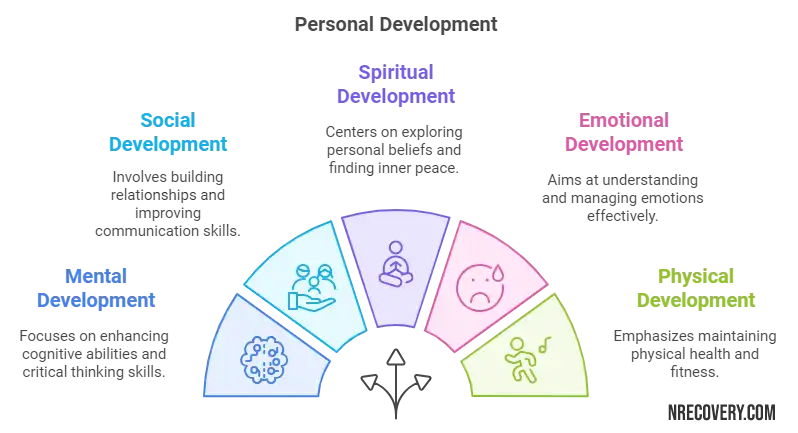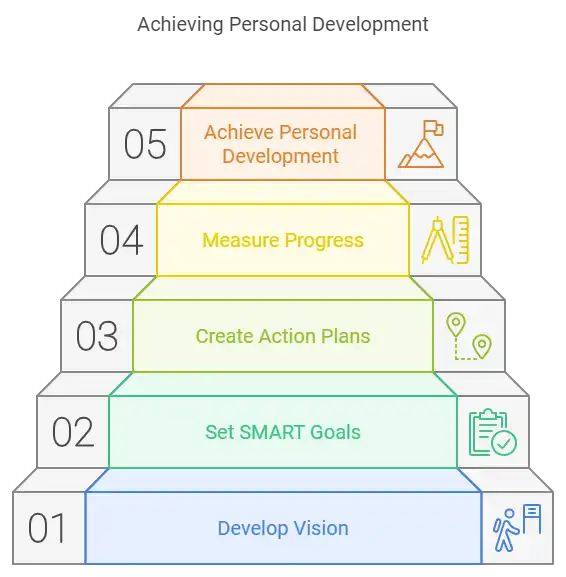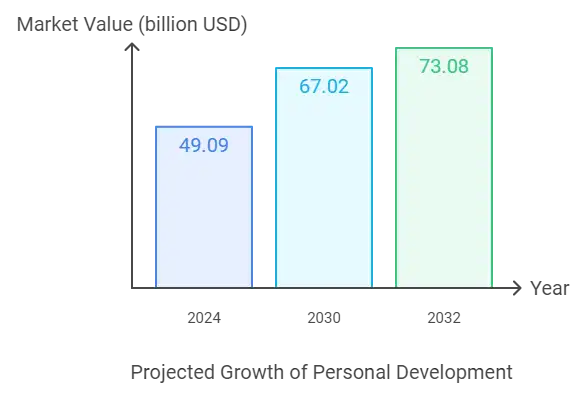What is Personal Development? A Complete Growth Guide (2025)

Personal development is the lifelong process of enhancing your capabilities, potential, and quality of life. It involves skill learning, and goal setting to improve various aspects of your life, including career, relationships, and overall well-being.
Introduction to Personal Development
Self-Improvement and Life-Long Learning
Personal development is a journey that never ends. It’s about constantly learning and growing throughout your life. This might involve:
- Reading self-help books with focused intention, taking notes, and actually implementing the strategies and insights gained from each reading session
- Attending workshops, seminars or blogs that align with your goals, actively participating in discussions, and building valuable connections with like-minded individuals
- Taking online courses from reputable platforms, completing assignments, and applying the knowledge directly to real-world situations
- Seeking feedback from mentors, colleagues, and friends, then using their insights to make meaningful adjustments to your behavior and approach
Enhancing Capabilities and Potential
Personal development helps you unlock your hidden talents and abilities. It’s about pushing your boundaries and discovering what you’re truly capable of. This could mean:
- Learning through structured practice, whether it’s a language, technical ability, or creative pursuit, and sticking with it until you achieve mastery
- Taking on challenging projects that stretch your abilities and force you to develop new competencies, even when they feel uncomfortable or daunting
- Stepping out of your comfort zone by deliberately seeking new experiences, meeting new people, and taking calculated risks that lead to growth
Improving Quality of Life
Ultimately, it is about making your life better. It can help you:
- Find more happiness and fulfillment by aligning your actions with your values, pursuing meaningful goals, and cultivating a positive mindset
- Achieve better work-life balance through effective time management, setting healthy boundaries, and prioritizing activities that truly matter
- Build stronger relationships by developing better listening skills, showing genuine empathy, and maintaining healthy boundaries
- Improve your physical and mental health through consistent exercise, proper nutrition, stress management, and regular self-care practices
Holistic Self-Discovery
Self-Awareness and Self-Knowledge
Understanding yourself is the foundation of personal development. This involves:
- Recognizing your strengths and weaknesses through honest self-assessment, feedback from others, and regular reflection on your experiences and performance in different situations
- Identifying your values and beliefs by examining what truly matters to you, understanding your moral compass, and recognizing how your principles guide your decisions and actions
- Understanding your emotions and reactions by monitoring your triggers, analyzing your behavior patterns, and developing better emotional regulation strategies in challenging situations
Skill Development
Improving your skills is crucial for personal and professional growth. This could include:
- Technical skills related to your job, such as mastering specific software, learning industry-standard tools, or obtaining relevant certifications that enhance your professional value
- Soft skills like communication and leadership, including public speaking, conflict resolution, team management in workplace interactions
- Creative skills like writing or painting, which not only provide personal fulfillment but also enhance abilities and cognitive flexibility
Identity and Self-Esteem
Building a strong sense of self is important for personal development. This involves:
- Developing self-confidence through acknowledging achievements, setting and reaching goals, and maintaining a positive yet realistic self-image
- Accepting yourself by embracing both strengths and limitations, practicing self-compassion, and letting go of unrealistic expectations
- Setting healthy boundaries in relationships, work, and personal time to protect your well-being and maintain respectful interactions
Career Growth
Personal development can significantly impact your career. It includes:
- Setting career goals that align with your values, skills, and long-term aspirations while considering market trends and opportunities
- Developing professional skills through targeted training, mentorship programs, and practical experience in your chosen field
- Networking and building relationships by attending industry events, maintaining professional connections, and cultivating meaningful work relationships
Health and Lifestyle
Taking care of your physical and mental health is a crucial part of personal development. This involves:
- Eating a balanced diet that provides necessary nutrients, maintains energy levels, and supports overall health through mindful food choices
- Exercising regularly with a mix of cardio, strength training, and flexibility work tailored to your fitness level and goals
- Practicing stress management techniques such as meditation, deep breathing, or yoga to maintain mental clarity and emotional balances
Goal-Setting and Aspirations
Setting and achieving goals is a key part of personal development. This includes:
- Identifying what you want to achieve by clarifying your vision, understanding your motivation, and ensuring your goals align with your values
- Creating action plans with specific, measurable steps, timelines, and contingency strategies for potential obstacles
- Tracking your progress through regular review sessions, adjusting strategies as needed, and celebrating milestones along the way
Social Relations
Improving your relationships is vital for personal growth. This involves:
- Developing empathy by actively listening to others’ perspectives, putting yourself in their shoes, and responding with genuine understanding and compassion, even in challenging situations or when dealing with differing viewpoints
- Improving communication skills through practicing active listening, learning to express thoughts clearly, using appropriate body language, and adapting your communication style to different audiences and situations
- Managing conflicts effectively by staying calm under pressure, finding win-win solutions, addressing issues promptly and professionally, and maintaining positive relationships even during disagreements or challenging conversations
Spiritual Identity
For many people, spiritual growth is an important aspect of personal development. This might include:
- Exploring your beliefs and values through reading spiritual texts, engaging in philosophical discussions, attending religious or spiritual gatherings, and questioning deeply held assumptions about life and existence
- Practicing mindfulness or meditation through daily rituals, guided sessions, breathing exercises, or silent reflection, helping you stay present, reduce stress, and maintain inner peace amid life’s challenges
- Connecting with a higher purpose by understanding your role in the larger scheme of life, contributing to causes bigger than yourself, and aligning your actions with your spiritual beliefs while respecting others’ different paths and perspectives
Maximizing Your Full Potential

Mental Development
Mental development involves improving your cognitive abilities, such as:
- Critical thinking through analyzing complex situations, questioning assumptions, and making well-reasoned decisions based on careful evaluation of evidence and multiple perspectives
- Problem-solving by developing systematic approaches to challenges, breaking down complex issues into manageable parts, and creating innovative solutions using both logic and creativity
- Creativity through exploring new ideas, experimenting with different approaches, and developing original solutions that challenge conventional thinking patterns
- Learning new skills by actively pursuing knowledge in various fields, applying theoretical concepts to practical situations, and consistently pushing your intellectual boundaries
Social Development
Social development focuses on improving your relationships and social skills, including:
- Communication through mastering both verbal and non-verbal cues, adapting your style to different audiences, and ensuring your message is clear, respectful, and effectively conveyed
- Empathy by genuinely understanding others’ perspectives, recognizing emotional states, and responding with appropriate sensitivity and support in various situations
- Conflict resolution through diplomatic handling of disagreements, finding common ground, and maintaining positive relationships even during challenging interactions
- Networking by building and maintaining meaningful professional relationships, contributing value to your connections, and creating mutually beneficial partnerships
Spiritual Development
Spiritual development is about connecting with your inner self and finding meaning in life. This might involve:
- Meditation through regular practice of mindfulness, focused breathing, and cultivating inner peace while managing daily stresses and challenges
- Reflection through journaling, contemplative practices, and dedicated time for examining your beliefs, actions, and life direction
- Exploring your beliefs and values through philosophical inquiry, religious study, or secular spirituality while respecting diverse perspectives and finding your authentic path
Emotional Development
Emotional development involves understanding and managing your emotions better. This includes:
- Emotional intelligence through recognizing and responding appropriately to both your own emotions and those of others, while maintaining healthy boundaries and relationships
- Stress management by developing effective coping mechanisms, practicing relaxation techniques, and maintaining balance in challenging situations
- Self-regulation through controlling impulses, managing reactions, and maintaining composure under pressure while expressing emotions in healthy ways
Physical Development
Physical development focuses on improving your health and fitness. This involves:
- Regular exercise through a balanced combination of cardiovascular activity, strength training, and flexibility work tailored to your fitness level and goals
- Healthy eating by maintaining a balanced diet, understanding nutrition, and making mindful food choices that support your energy levels and overall health
- Adequate sleep through establishing consistent sleep patterns, creating optimal sleep environments, and practicing good sleep hygiene for better recovery and mental clarity
- Stress reduction through physical activities, relaxation techniques, and lifestyle choices that promote overall well-being and body-mind balance
Personal Development in Education
Early Education
In early education, personal development focuses on:
- Building social skills through structured group activities, collaborative projects, and guided play that helps children learn to share, communicate effectively, and work together while developing empathy
- Developing self-confidence through age-appropriate challenges, positive reinforcement, and opportunities to try new things in a safe, supportive environment that celebrates both effort and achievement
- Encouraging curiosity and creativity through hands-on learning experiences, open-ended questions, and exploratory activities that stimulate imagination and foster a natural love for discovery and learning
Higher Education
In higher education, personal development often involves:
- Career planning through internship programs, career counseling sessions, and professional networking events that help students align their studies with future career goals and industry demands
- Leadership via student organizations, group projects, and workshops that provide practical experience in team management, decision-making, and organizational skills
- Critical thinking through challenging coursework, research projects, and debate activities that encourage analytical reasoning and the evaluation of complex ideas
- Self-reflection through journaling exercises and personal development courses that help students understand their values, strengths, and areas for growth
Lifelong Learning
Personal development is a lifelong process. It involves:
- Continuous learning through formal education, self-study, and practical experience that keeps skills relevant and knowledge current in an ever-changing world
- Adapting to new challenges by developing resilience, flexibility, and problem-solving skills while embracing change as an opportunity for growth rather than a threat to stability
- Staying curious and open-minded by actively seeking new experiences, engaging with diverse perspectives, and maintaining a growth mindset that views challenges as opportunities to learn and improve
Workplace Applications
Business Schools and Leadership Programs
Many business schools now include personal development in their curricula, focusing on:
- Leadership skills through intensive workshops, real-world case studies, and practical exercises that develop strategic thinking, decision-making abilities, and team management capabilities essential for modern business leadership
- Emotional intelligence by training future leaders to understand and manage both their own emotions and those of their teams, leading to better workplace relationships, improved conflict resolution, and more effective team collaboration
- Self-awareness through personality assessments, 360-degree feedback sessions, and structured reflection exercises that help leaders understand their management style, strengths, and areas for improvement
Professional Development in Organizations
Organizations often offer related opportunities, such as:
- Training programs that combine both technical and soft skills, including virtual learning platforms, in-person workshops, and certification courses tailored to specific industry needs and organizational goals
- Mentee relationships that pair experienced professionals with emerging talent, providing guidance, career advice, and institutional knowledge transfer while creating valuable networking opportunities
- Coaching sessions with professional development experts who help employees identify goals, overcome obstacles, and accelerate their career through personalized guidance and accountability
Interdisciplinary Approaches
Personal development in the workplace often draws from various fields, including:
- Psychology principles such as behavioral science, motivation theory, and cognitive development to understand and improve workplace performance, team dynamics, and individual growth patterns
- Sociology concepts that help organizations understand group dynamics, cultural influences, and social structures that impact workplace behavior and organizational effectiveness
- Management theory incorporating modern leadership frameworks, organizational behavior research, and best practices from successful companies to create effective development programs and strategies
Personal Development Planning

Developing a Personal Vision
Start by creating a clear vision of what you want to achieve. Ask yourself:
- Where do I want to be in 5 years? Consider your career aspirations, personal relationships, financial goals, health objectives, and desired lifestyle, then create a detailed picture of your ideal future state
- What kind of person do I want to become? Reflect on character traits you’d like to develop, habits you want to build, and the impact you wish to have on others and your community
- What are my core values? Identify principles that truly matter to you, such as integrity, growth, compassion, or excellence, and ensure your goals align with these fundamental beliefs
Setting SMART Goals
Use the SMART framework to set and achieve your goals:
- Specific: Define exactly what you want to achieve with clear details, like “secure a senior management position in marketing” rather than just “get promoted”
- Measurable: Establish concrete criteria for tracking progress, such as “increase sales by 25%” or “learn to speak Spanish at B2 level”
- Achievable: Set challenging but realistic goals based on your current resources, skills, and circumstances while considering potential obstacles
- Relevant: Ensure goals align with your broader life vision, career path, and personal values while contributing to your long-term success
- Time-bound: Set clear deadlines and milestones to create urgency and maintain focus, like “complete project management certification within 6 months”
Creating Action Plans
Break down your goals into actionable steps. Create a plan that outlines:
- What you need to do by identifying specific tasks, required resources, potential obstacles, and strategies to overcome them while maintaining flexibility for adjustments
- When you’ll do it by creating a detailed timeline with daily, weekly, and monthly targets that account for your current commitments and energy levels
- How you’ll measure progress through establishing clear metrics, checkpoints, and success indicators that help you stay on track and motivated
Measuring Progress and Feedback
Regularly assess your progress and seek feedback. This might involve:
- Keeping a journal to track daily achievements, challenges faced, lessons learned, and insights gained while maintaining accountability to yourself
- Using tracking apps that help monitor habits, measure productivity, set reminders, and visualize progress through data and analytics
- Asking for feedback from peers who can provide honest assessments, constructive criticism, and valuable insights based on their experience and expertise
Benefits of Personal Development
Enhanced Employability
Personal development can boost your career prospects by:
- Improving your skills through continuous learning, professional certifications, and practical experience in your field, making you more valuable to current and potential employers in an increasingly competitive job market
- Increasing your confidence by mastering new abilities, successfully handling challenging projects, and developing a track record of achievements that demonstrates your capability to take on greater responsibilities
- Making you more adaptable by developing a growth mindset, embracing change readily, and quickly learning new technologies or methodologies as industries evolve and workplace demands shift
Increased Confidence
- Setting and accomplishing increasingly challenging objectives that prove your capabilities to yourself
- Receiving positive feedback and recognition from peers and superiors as your competence grows
- Developing resilience through overcoming obstacles and learning from setbacks
- Building a strong track record of success that reinforces your belief in your abilities.
Improved Relationships
Personal development can help you build stronger, more meaningful relationships by improving your:
- Communication skills through learning to express yourself clearly, listening actively to others’ perspectives, adapting your communication style to different situations, and effectively conveying your thoughts and feelings in both personal and professional contexts
- Empathy by developing a deeper understanding of others’ emotions and experiences, showing genuine concern for their well-being, and responding appropriately to their needs and circumstances
- Emotional intelligence through better recognition and management of your own emotions, understanding others’ emotional states, and navigating social situations with greater awareness and sensitivity
Better Time Management
Learning to manage your time effectively is a key part of your personal development journey. By mastering time management skills, you can accomplish more in less time, reduce stress, and maintain a better work-life balance. Successful professionals often credit their achievement to strong time management practices.
Greater Resilience
It helps you build resilience, allowing you to bounce back from setbacks more easily. This emotional strength becomes particularly valuable during challenging periods, whether facing career obstacles or personal difficulties. Research shows that resilient individuals are better equipped to handle stress and adapt to change.
Improved Health and Well-Being
Many aspects contribute to better physical and mental health. Through personal development practices like mindfulness, regular exercise, and stress management, you can enhance your overall quality of life. Studies have shown that individuals who prioritize personal growth often report higher levels of life satisfaction and better health outcomes.
The Worldwide Industry
The worldwide industry is experiencing significant growth and transformation, driven by increasing awareness of self-improvement and the proliferation of digital platforms. This sector encompasses a wide range of products and services aimed at enhancing individuals’ personal and professional lives.

Market Size and Growth
The global market is on a robust growth trajectory. In 2024, the market is estimated to be valued at USD 49.09 billion, with projections indicating it will reach USD 73.08 billion by 20321. This represents a compound annual growth rate (CAGR) of 5.1% from 2024 to 2032. Another forecast suggests the market could reach USD 67.02 billion by 2030, growing at a CAGR of 5.5% from 2023 to 2030.
Instruments
- Personal Coaching/Training: This segment dominated the market with a 41% share in 2023. It includes executive and leadership coaching, financial coaching, and career coaching.
- Books: This segment is expected to show the fastest growth, driven by increasing adoption among younger people and the rise of e-books and audiobooks.
- E-Platforms: Including mobile and web application-based solutions, this segment is growing due to technological advancements.
- Workshops & Seminars: These continue to be popular formats.
Focus Areas
- Skillset Enhancement: This area held the largest revenue share of over 31% in 2022, covering communication, teamwork, decision-making, and problem-solving skills.
- Mental Health: An increasingly important focus in personal development programs1.
- Motivation & Inspiration: A key area driving market growth.
- Physical Health: An integral part of holistic personal development.
- Self-Awareness: A growing focus for individuals seeking personal growth.
Market Drivers
Several factors are contributing to the growth of the industry:
- Increasing Self-Awareness: Growing cognizance about self-awareness and psychological well-being is driving demand for programs.
- Technological Advancements: The rise of virtual learning platforms and innovative digital solutions is making personal development more accessible.
- Corporate Initiatives: Many companies are offering professional development programs to their employees, often through online platforms.
- Mental Health Awareness: Rising stress levels and mental health concerns are accelerating growth opportunities in the market.
- COVID-19 Impact: The pandemic has boosted the uptake of online programs as people seek to improve their well-being and skills during lockdowns.
Regional Insights
North America, Europe, and Asia-Pacific are the leading contributors to the global . Asia Pacific is anticipated to grow at the fastest CAGR of over 7% during the forecast period, driven by rapid economic growth, increasing awareness of personal growth, a youthful population, technological advancements, and supportive policies.
Key Players
Major companies in the market include Dale Carnegie & Associates Inc., Franklin Covey Co., Landmark Worldwide, Success Resources America, Omega Institute, SkillPath, Toastmasters International, and Nutrisystem Inc. These companies are expanding their offerings and leveraging digital platforms to reach wider audiences. In conclusion, the worldwide industry is poised for continued growth, driven by technological innovation, increasing awareness of mental health and self-improvement, and the growing demand for skill enhancement in a rapidly evolving job market.
Historical and Cultural Perspectives
Personal development isn’t a new concept, but a timeless human pursuit that has evolved across civilizations, reflecting our fundamental desire for self-improvement and meaning.
Ancient Greek Philosophy
The Greeks had a profound concept called “eudaimonia,” which means human flourishing. Philosophers like Aristotle viewed personal growth not just as self-improvement, but as a moral imperative. In the bustling city-states of Athens, where intellectual discourse was a way of life, the idea of continuous self-development was seen as essential to living a virtuous and fulfilling life. Aristotle argued that true happiness comes from developing one’s potential and living according to reason.
Chinese Philosophy
Confucius elevated personal cultivation from an individual practice to a societal transformation tool. In a culture deeply rooted in harmony and collective well-being, he saw self-improvement as a ripple effect: by cultivating oneself, one could improve family dynamics, community relationships, and ultimately, create a more balanced and peaceful world. This holistic view contrasted sharply with purely individualistic approaches to personal growth.
Indian Traditions
Rooted in millennia of spiritual exploration, Indian philosophies approached personal development as a holistic journey of the soul. From the meditative practices of yoga to the philosophical inquiries of the Upanishads, these traditions viewed self-discovery as a profound path to understanding universal consciousness. Unlike Western approaches that often focus on external achievements, Indian traditions emphasized inner peace, wisdom, and spiritual connection.
Islamic Personal Development
In Islamic tradition, personal development is deeply intertwined with spiritual growth and divine purpose. The concept of “tarbiyah” (nurturing) suggests that self-improvement is a sacred responsibility, aligned with understanding one’s relationship with God and contributing positively to community. This approach sees personal growth as a form of worship and a means of becoming a more compassionate, ethical individual.
Modern Psychological Contributions
Many psychologists have contributed to our understanding of personal development. Here are some key figures:
Alfred Adler: Lifestyle and Self-Image
Challenging Freudian determinism, Adler introduced revolutionary ideas about individual agency. He proposed that our lifestyle and self-image are not fixed but malleable, shaped by our social interactions and personal interpretations of experiences.
Carl Jung: Individuation
Jung went beyond traditional psychological models, introducing the transformative concept of individuation. He saw personal development as a deep psychological process of integrating conscious and unconscious aspects of personality, ultimately leading to a more authentic, whole self.
Daniel Levinson: Life Stages
Levinson’s groundbreaking research revealed personal development as a dynamic process. By mapping psychological transitions across different life stages, he demonstrated that growth isn’t linear but a series of complex, interconnected transitions.
Albert Bandura: Self-Efficacy
Bandura revolutionized understanding of human potential by introducing self-efficacy – the belief in one’s ability to succeed. His research showed that this belief is not just a mental state, but a powerful psychological mechanism that directly influences achievement and personal transformation.
Martin Seligman: Positive Psychology
Breaking from psychology’s traditional focus on pathology, Seligman pioneered positive psychology. By shifting attention to human strengths, virtues, and potential for happiness, he provided a scientifically grounded framework for understanding personal growth and well-being.
Maslow’s Hierarchy of Needs
Abraham Maslow’s hierarchy of needs is a well-known theory in personal development. It suggests that we have different levels of needs, and we can only focus on higher needs once our basic needs are met.
The levels of the Maslow hierarchy are:
- Physiological Needs (food, water, sleep)
- Safety Needs (security, stability)
- Love and Belongingness (relationships, friendships)
- Esteem Needs (respect, recognition)
- Cognitive Needs (knowledge, understanding)
- Aesthetic Needs (beauty, balance)
- Self-Actualization (reaching your full potential)
Conclusion
Personal development is a lifelong journey of self-improvement and growth. It encompasses various aspects of life, from career and relationships to health and spirituality.





Responses